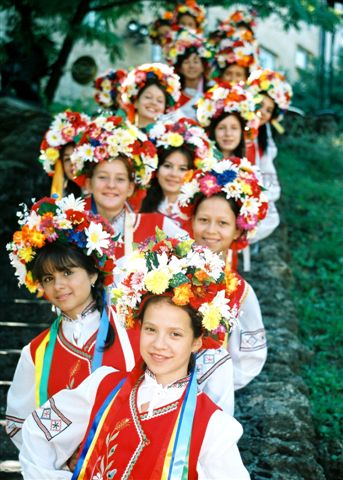Ukraine Today
Watch and Read about Ukraine Today

Ukraine information
Street view of Ukrainian cities on Google
Ivana Kupala Day

This is a pagan fertility rite, which has been accepted into the Orthodox Christian calendar. It is a traditional midsummer day in Western Europe with which some pre-Christian traditions have been associated. It is opposed to the winter solstice holiday, or Korochun.
The name of this holiday combines the words Ivan (the Slavic name of John the Baptist), and "Kupala", a word derived from the Slavic word for bathing, as it was the first day of the year when the church sanctioned bathing and swimming in rivers and ponds.
Up to the present day, Ivan's Day is known as one of the most expressive East Slavic folk and pagan holidays. Many rites of this holiday are connected with water, fertility and purification. The girls, for example, would float their flower garlands on the water of rivers and tell their fortunes from their movement. Lads and girls would jump over the flames of bonfires.
There is an ancient belief that the Eve of Ivan Kupala is the only time of the year when the ferns are blooming. Whoever finds a fern-flower would become immensely rich. Hence, on that night village folk would roam through the forests in search of magical herbs. In N.Gogol's story The Eve of Ivan Kupala, a young man finds the fabulous fern-flower but is cursed by it. The witches' sabbath on the Eve of Ivan Kupala inspired a famous Russian composer M.Musorgsky to compose his Night on Bald Mountain.
 In pre-Christian Ukraine, the festival was really a fertility rite that was supposed to assure a good harvest. (Kupalo was believed to be the god of Love and of Harvest. He was personified as the earth's fertility). From the descriptions in ancient chronicles it was rather wild, featuring all kinds of sexual excesses... in other words, a lot of fun.
In pre-Christian Ukraine, the festival was really a fertility rite that was supposed to assure a good harvest. (Kupalo was believed to be the god of Love and of Harvest. He was personified as the earth's fertility). From the descriptions in ancient chronicles it was rather wild, featuring all kinds of sexual excesses... in other words, a lot of fun.
With the coming of Christianity, the Church tried to suppress the festival, but it was unsuccessful. So they did what they normally did: they combined the festival of the pagan god Kupalo with the feast of the Nativity of St. John the Baptist (July 6th, Julian Calendar) and called it "Ivana Kupala." The customs were cleaned up a bit, but it's still a feast for young unmarried people, with plenty of opportunities for "making whoopie."
They gathered together outside the village in the forest or near a stream or pond, where they built bonfires. The fires were not allowed to go out. They were also used to burn herbs and various items that were blessed. One legeng has it that this is the only night of the year when you can see the flowers of the fern glow in the dark. Other legends suggest that the sun is playing games, that trees can walk from place to place, and that this night  is a perfect opportunity to find out who is the village witch.
is a perfect opportunity to find out who is the village witch.
Celebrations usually go on night, especially in the countryside. Young unmarried men in village make the Kupalytsia doll, and dress it up like a girl. Young women work on the Kupala doll and dress it up like a man. At the end of celebration, the Kupala doll is burned in a fire, and the Kupalytsia is drowned in water.
The girls sing special songs ("kupalni"), with a lot of references to love and marriage. They also put a burning candle in the middle of a flower garland and float it on the water and tell their fortunes from the behavior of the garland in the water.
The girls sing special songs ("kupalni"), with a lot of references to love and marriage. They also float flower garlands on the water and tell their fortunes from the behavior of them. Both boys and girls jump over the bonfire,  again to tell fortunes.
again to tell fortunes.
Young boys and girls jump over a fire holding hands. According to the legend, the couple will stay together as long as they do not let go of each other’s hands.
Christianity brought new meaning to the holiday. It is birthday of the John Baptist, and as often happens in Ukrainian culture, the pagan and Christian traditions have come together other time. Hence the name Ivana (from John the Baptist) Kupala Day.



